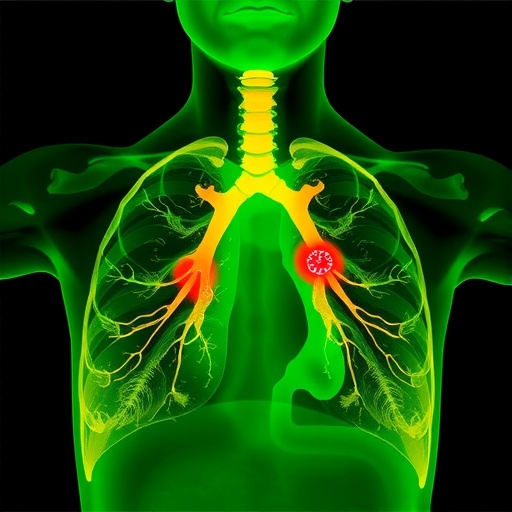In a groundbreaking retrospective study published in BMC Cancer, researchers have unveiled a promising correlation between the addition of hyperthermia to thoracic radiotherapy and a markedly reduced incidence of radiation pneumonitis (RP), a potentially severe complication commonly feared in cancer treatments involving the chest. This discovery could herald a new era of safer and more effective radiotherapeutic interventions for patients battling thoracic malignancies.
Radiation pneumonitis has long been recognized as a debilitating side effect of thoracic radiotherapy, characterized by inflammation and damage to lung tissue following exposure to ionizing radiation. Its development significantly impacts patient quality of life and can limit the therapeutic doses clinicians are able to safely administer. With the aim to mitigate this clinical hurdle, the study’s investigators embarked on an exploration of the synergistic potential of controlled hyperthermia—a method involving the application of heat to tumor regions—as an adjunct to standard radiotherapy protocols.
The study meticulously enrolled 233 patients diagnosed with various thoracic cancers between 2017 and 2020. These patients were stratified into two cohorts: the radiotherapy plus hyperthermia group (RHT, n=114) and the radiotherapy-only group (RT, n=119). Careful follow-up extended from three months pre-treatment through a six-month post-therapy window to capture the incidence and severity of RP within a clinically meaningful timeframe.
Of particular interest were patients whose lung volumes receiving a radiation dose exceeding 20 Gray (V20 > 20%), a well-established threshold associated with increased RP risk. Within this subset, the study found a significant disparity in the incidence of moderate to severe RP, defined as grade ≥ 2. The hyperthermia-augmented treatment group exhibited a 33.33% rate of grade ≥ 2 RP, substantially lower than the 55.32% observed in the standard radiotherapy cohort. This statistically robust contrast underlines hyperthermia’s potential protective effect on lung tissue, a finding of enormous clinical relevance.
Delving deeper into the treatment parameters, the study uncovered that the frequency of hyperthermia sessions was inversely correlated with RP occurrence, pointing towards a dose-response relationship. Patients receiving more hyperthermic interventions experienced fewer incidents of significant lung inflammation, suggesting that repeated thermal conditioning might enhance tissue resilience to radiation-induced injury.
These pivotal observations extended beyond univariate analyses. In multivariate regression models adjusting for confounding variables, gender, performance status (PS) score, and the number of hyperthermia treatments emerged as significant independent predictors of RP risk. This robust analytical approach reinforces the therapeutic value of integrating hyperthermia in managing thoracic radiotherapy and offers clinicians tangible metrics to optimize personalized treatment plans.
The physiological mechanisms underpinning hyperthermia’s protective effects remain an area of active investigation. It is hypothesized that controlled heat application may sensitize tumor cells to radiation while simultaneously promoting repair pathways and modulating immune responses in normal lung tissue, thereby attenuating inflammatory cascades that precipitate pneumonitis. Additionally, hyperthermia may improve tumor oxygenation, indirectly contributing to enhanced radiation efficacy and reduced collateral lung damage.
This study’s retrospective design, while reflective of real-world clinical practice, invites future prospective randomized trials to confirm causality and delineate precise hyperthermia protocols maximizing patient benefit. Moreover, the integration of advanced imaging and biomarker analyses could unravel patient subsets most likely to derive protective effects, enabling precision oncology approaches.
The findings resonate profoundly within the broader oncology community, as they address a persistent treatment-limiting toxicity that compromises both survival and quality of life in thoracic cancer patients. By harnessing hyperthermia’s therapeutic potential, oncologists could recalibrate the balance between achieving tumor control and sustaining pulmonary health.
Furthermore, the study stimulates ongoing discourse about multidimensional cancer treatment paradigms. It spotlights the necessity to transcend monotherapy models and embrace combination strategies that synchronize modalities to maximize efficacy while minimizing harm—a cornerstone of modern cancer care.
In summation, this pioneering research illuminates hyperthermia as a compelling adjunct to thoracic radiotherapy that significantly diminishes the risk of radiation pneumonitis in patients with high V20 lung exposure. The evidence advocates for its clinical adoption and spurs an invigorated quest to optimize hyperthermia parameters, integrating thermal therapy into standard oncologic protocols.
As the oncology landscape evolves, this discovery charts a pathway toward safer, more tolerable treatments for thoracic malignancies, potentially improving outcomes and enriching patient experiences. It is a powerful testament to the innovative spirit driving therapeutic advances and underscores the critical intersection of thermal sciences and radiation oncology.
Clinical practitioners and researchers alike are poised to leverage this knowledge, transforming collective understanding and practice to elevate lung cancer care standards globally. The synergy of heat and radiation now stands as a beacon of hope amidst the complexities of thoracic cancer management.
The profound impact of hyperthermia adjunct therapy warrants dissemination across scientific forums and clinical networks, catalyzing widespread implementation and fostering multidisciplinary collaborations to refine and expand its utility. Future investigations will undoubtedly build upon these insights, continuing to unravel the full spectrum of hyperthermia’s radioprotective mechanisms.
In conclusion, the study’s landmark findings affirm hyperthermia as a game-changing tool against radiation pneumonitis, charting a course to enhanced therapeutic indices in thoracic oncology. By mitigating lung toxicity without compromising tumor control, this approach holds promise to rewrite treatment algorithms and improve patient prognoses worldwide.
Subject of Research: The impact of combining hyperthermia with thoracic radiotherapy on the incidence of radiation pneumonitis in patients with thoracic cancers.
Article Title: Hyperthermia correlates with low incidence of radiation pneumonitis after thoracic radiotherapy: a retrospective study
Article References:
Gao, W., Liang, J., Wang, L. et al. Hyperthermia correlates with low incidence of radiation pneumonitis after thoracic radiotherapy: a retrospective study. BMC Cancer 25, 1731 (2025). https://doi.org/10.1186/s12885-025-15100-0
Image Credits: Scienmag.com
DOI: 10.1186/s12885-025-15100-0 (Published 08 November 2025)




